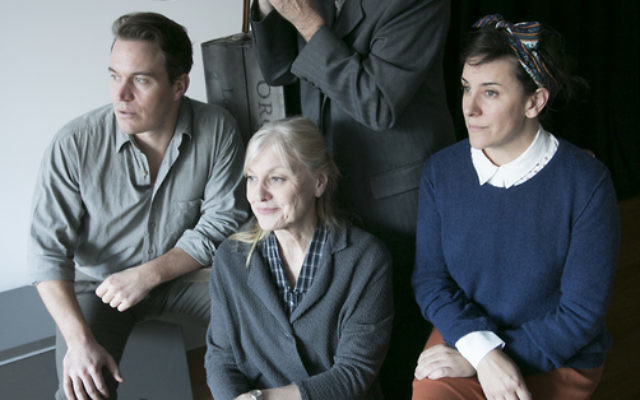Messing with morals
In the upcoming production of The Man in the Attic, a German couple deceive a Jewish man who they are hiding into thinking that the Nazis have won the war. Incredibly, the play is based on a true story.

WE can often be quick to demonise Nazis as pure evil villains, and righteous citizens who risked their lives to save Jews as selfless heroes.
But in The Man In The Attic – produced by Shalom and Moira Blumenthal Productions – award-winning playwright Timothy Daly turns such preconceived assumptions on their heads.
After a German couple find a Jewish watchmaker and jeweller on the run in the forest, they decide to shelter him in their attic.
But the couple’s seemingly virtuous act is not solely done out of the goodness of their hearts.
Taking advantage of a fragile situation for their own financial gain, the couple put the Jew to work, repairing watches and clocks – mechanical devices that they then bartered on the black market.
The already intriguing narrative takes a shocking twist when liberation is declared, and the couple makes a firm, life-altering decision to tell their prisoner that the Nazis have won, before keeping the Jew as prisoner for their own self-interest.
“The couple have to keep the fake news going,” explains director Moira Blumenthal.
“There are loudspeaker announcements from the Americans that the couple have to keep the Jew from hearing.”
But gradually, suspicion is aroused as the Jewish prisoner pieces together a series of clues, realising that something drastic has changed.
“The bombing has stopped … the German wife forgets to switch the radio off, and she has to make up a reason [to explain] why the American radio is announcing,” says Blumenthal, who last year directed a successful production of You Will Not Play Wagner.
Awarded the Patrick White Playwrights’ Award in 2007, The Man In The Attic traces the emotional journey of the Jewish prisoner, and the questionable moral choices made by the couple.
“The Jew starts off being grateful that the couple are saving him, giving him food and shelter, but then it becomes something else – enormous frustration.”
He also becomes worried, perceiving himself as a coward – a common issue affecting Jews who were in hiding, says Blumenthal, as many were plagued with questions of “should I be out there fighting?” and “shouldn’t I be outside looking for my family?”
For the wife and husband, two conflicting moralities are explored in tandem, creating a crescendo of dramatic tension.
“The woman is pulled between helping the Jew, looking after him, keeping him company and at the same time benefitting from what he is doing … The man is very different – he is using the black market, is a very streetwise character, and using the situation in order to help him survive.”
Blumenthal provides a well-rounded conclusion. “They are nicely drawn characters, but they are different and in conflict about what to do with the man,” she says.
The complexity of the characters Daly has crafted, and the dilemmas they face prompt the audience to consider their own moral compass.
“What would you do? Would you be a bystander, or would you actually help? And how could you make that decision in advance?” asks Blumenthal.
An Australian playwright with numerous national and international productions to his name including Kafka Dances and Derrida In Love, Daly explains the motivation behind his play’s powerful premise.
“I tried, in the three German characters, to represent as many of the possible attitudes to the Hitler problem, so to speak, so that people wouldn’t feel that it is a simple moral saga of good and evil,” he says.
“Moral complexity has to come slowly in a good play, rather than [the audience] being confronted with shocking, ghastly evil at the start because that keeps [them] away from their own potential moral complex involvement in it all. The moral discomfort needs to creep slowly, so first of all, you show the humanity of the characters on stage so the audience says ‘well, that’s almost me’.”
“When a crisis arrives in history, there are so many options possible. Who are we to know what we would do? Would we be cowardly, brave, idealistic, opportunistic?”
Daly himself has had ample time to ponder these questions, after initially coming across this true story in a book of old German radio plays, over a decade ago.
“When I first read about it, I had to check that I was reading correctly,” Daly comments. “I couldn’t have invented a more bizarre twist,” and he adds that “the play is the most mismatched, bizarre love story I have ever written between a guilty German wife who can hardly sleep at night, and the Jew up in the attic”.
As he ventured into relatively unknown territory, attempting to find out as much about the mysterious story as he could, Daly came to somewhat of a realisation.
“There weren’t just one or two – thousands upon thousands of Jews were hidden,” he says. “I realised that I am going to have to make it a story of every man, every Jew in every attic, cupboard, closet, basement, cellar and sky loft.”
The Man in the Attic is at Eternity Playhouse Darlinghurst from July 5-22. Bookings: www.shalom.edu.au
SOPHIE DEUTSCH

comments